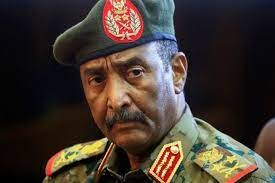Sudan’s coup leader General Abdel Fattah al-Burhan has said the army will withdraw from ongoing political talks and allow political and revolutionary groups to form a civilian transitional government, Aljazeera reported on Monday.
The statement came on Monday following a deadly week for Sudan’s pro-democracy movement as large-scale protests demanding an end to the military rule continued in the Khartoum area since Thursday.
According to Aljazeera, protest groups remain skeptical that the military will truly step aside, with protesters continuing to take to the streets in Khartoum after al-Burhan’s announcement, calling for the military’s immediate departure from power.
The Central Committee of Sudanese Doctors (CCSD) reported that nine people have been killed and at least 629 injured by a recent security crackdown on the demonstrations.
“The armed forces will not stand in the way of democratic transition…, elections in which the Sudanese people choose who will govern them,” Al-Burhan said in a televised address.
The ruling sovereign council, led by al-Burhan and consisting of military and civilian members, will be dissolved after the formation of the new government, he said.
However, pro-democracy groups fear that could potentially take a long time, allowing the military to remain in power.
Al-Burhan said that a new Supreme Council of the Armed Forces would be created after the formation of the government and it will be responsible for security and defense tasks and “related responsibilities” in agreement with the government, the military leader said.
The army’s withdrawal from political talks was aimed at allowing the political and revolutionary groups to form the technocrat government, he said.
Al-Burhan called on the groups to start “an immediate and serious dialogue … that brings everyone back to the path of democratic transition”. The military will be committed to implementing the outcomes of the dialogue, he said, though he did not clarify how much of a political role the armed forces will have in the future.
Since the military seized power in October, authorities have met the near-weekly street protests with deadly repression, which has so far killed 113 people, including 18 children, according to monitors.
Since then, the UN political mission in Sudan, the African Union and the eight-nation, East African regional Intergovernmental Authority on Development group have been trying to broker a way out of the political impasse. But talks have yielded no results so far.
Pro-democracy groups have repeatedly said they will not negotiate with the military, and have called for them to immediately hand the reins to a civilian government.
Sudan has been plunged into turmoil since the military takeover upended its short-lived transition to democracy after 30 years of rule by al-Bashir.
Al-Bashir and the government were removed by the military after a popular uprising in April 2019.




